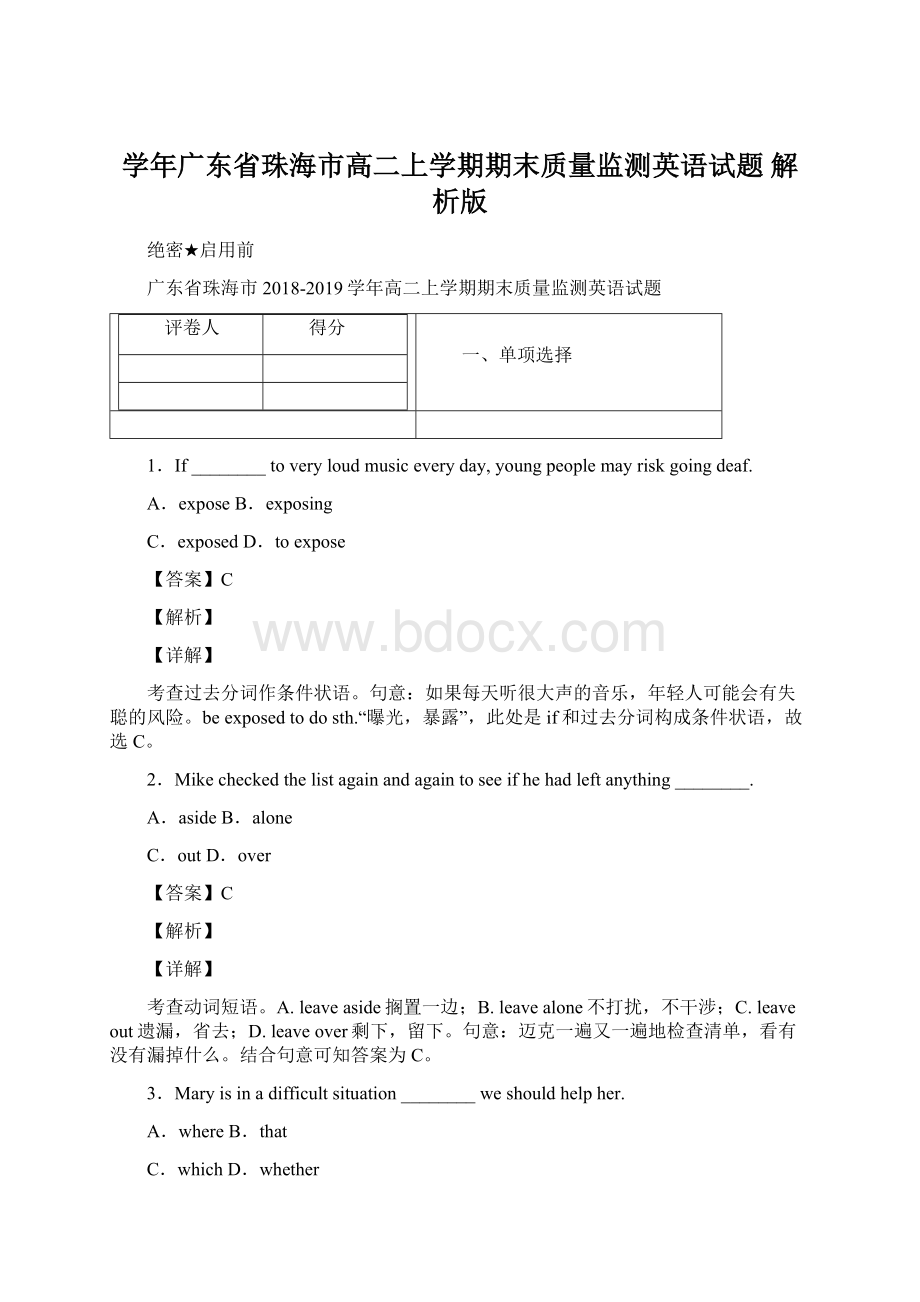学年广东省珠海市高二上学期期末质量监测英语试题 解析版.docx
《学年广东省珠海市高二上学期期末质量监测英语试题 解析版.docx》由会员分享,可在线阅读,更多相关《学年广东省珠海市高二上学期期末质量监测英语试题 解析版.docx(26页珍藏版)》请在冰豆网上搜索。

学年广东省珠海市高二上学期期末质量监测英语试题解析版
绝密★启用前
广东省珠海市2018-2019学年高二上学期期末质量监测英语试题
评卷人
得分
一、单项选择
1.If________toveryloudmusiceveryday,youngpeoplemayriskgoingdeaf.
A.exposeB.exposing
C.exposedD.toexpose
【答案】C
【解析】
【详解】
考查过去分词作条件状语。
句意:
如果每天听很大声的音乐,年轻人可能会有失聪的风险。
beexposedtodosth.“曝光,暴露”,此处是if和过去分词构成条件状语,故选C。
2.Mikecheckedthelistagainandagaintoseeifhehadleftanything________.
A.asideB.alone
C.outD.over
【答案】C
【解析】
【详解】
考查动词短语。
A.leaveaside搁置一边;B.leavealone不打扰,不干涉;C.leaveout遗漏,省去;D.leaveover剩下,留下。
句意:
迈克一遍又一遍地检查清单,看有没有漏掉什么。
结合句意可知答案为C。
3.Maryisinadifficultsituation________weshouldhelpher.
A.whereB.that
C.whichD.whether
【答案】A
【解析】
【详解】
考查定语从句。
句意:
玛丽处于一个我们应该帮助她的艰难困境。
此处situation是先行词,在后面的定语从句中作地点状语,故答案为A。
4.Itwasthetraining________shehadatschool________madeheragoodcyclist.
A.what,whatB.that,that
C.that,whichD.what,that
【答案】B
【解析】
【详解】
考查定语从句和强调句型。
句意:
她在学校接受的训练使她成为一名优秀的自行车运动员。
第一空thetraining作先行词,指物,在后面的定语从句中作宾语,所以填that;第二空是强调句型,强调句子主语thetraining,所以填that。
故答案为B。
【点睛】
浅谈强调句
1.用Itis/was...that/who...句型表示强调。
(1)陈述句的强调句型:
Itis/was+被强调部分(通常是主语、宾语或状语)+that/who(当强调主语且主语指人)+其它部分。
e.g.ItwasyesterdaythathemetLiPing.
(2)一般疑问句的强调句型:
同上,只是把is/was提到it前面。
e.g.WasityesterdaythathemetLiPing?
(3)特殊疑问句的强调句型:
被强调部分(通常是疑问代词或疑问副词)+is/was+it+that/who+其它部分?
e.g.Whenandwherewasitthatyouwereborn?
2.not...until...句型的强调句:
句型为:
Itis/wasnotuntil+被强调部分+that+其它部分:
e.g.普通句:
Hedidn'tgotobeduntil/tillhiswifecameback.
强调句:
Itwasnotuntilhiswifecamebackthathewenttobed.
注意:
此句型只用until,不用till。
但如果不是强调句型,till,until可通用;
因为句型中Itis/wasnot...已经是否定句了,that后面的从句要用肯定句,切勿再用否定句了。
3.强调谓语动词:
用助动词do,does或did加动词原形来强调谓语动词。
注意:
此种强调只用do/does和did,没有别的形式;过去时态用did,后面的谓语动词用原形。
如:
Docomeearly.务必早来。
Hedidsendyoualetterlastweek.昨天他确实寄给你一封信。
5.Removeclothingusingscissorsifnecessary________itisstucktothebum.
A.unlessB.until
C.althoughD.because
【答案】A
【解析】
【详解】
考查状语从句。
A.unless除非;B.until直到------为止;C.although尽管;D.because因为。
句意:
如果有必要,用剪刀把衣服剪下来,除非它粘在屁股上。
结合句意可知此处是unless引导的条件状语从句,故选A。
6.Doumenisso________thatit________totouristsfromallovertheprovince.
A.appealing,appealsB.appealed,appeals
C.appealed,appealedD.appealing,appealed
【答案】A
【解析】
【详解】
考查appeal的用法。
句意:
Doumen非常吸引人,结果吸引了来自全省各地的游客。
此处是形容词,“吸引人的”,结合句意第一空填appealing;第二空是so---that结果状语从句的谓语动词,主语是it,单数第三人称,句子是一般现在时态,所以填appeals。
故答案为A。
7.Hisstrengthran________afterhecoveredthatlongdistance.
A.intoB.away
C.acrossD.out
【答案】D
【解析】
【详解】
考查动词词组。
A.runinto陷入,撞上;B.runaway逃跑;C.runacross偶然碰见;D.runout用完,耗尽。
句意:
他跑完那么远的距离后,体力耗尽了。
结合句意可知答案为D。
8.Little________whereitwouldleadmewhenItookthetrip.
A.doIknowB.hadIknown
C.haveIknownD.didIknow
【答案】D
【解析】
【详解】
考查部分倒装。
句意:
当我开始旅行时,我几乎不知道它会把我引向何方。
结合句意可知句子用一般过去时态,再根据否定词Little位于句子开头,句子用部分倒装。
故答案为D。
【点睛】
含有否定意义的副词位于句首时的倒装:
在正式文体中,never,seldom,rarely,little,hardly,scarcely,nosooner,nolonger,nowhere等含有否定意义的副词若位于句首,则其后要用部分倒装:
如:
Ishallneverforgivehim./NevershallIforgivehim.我永远不会宽恕他。
注:
(1)对于not…until句型,当notuntil…位于句首时,其后的主句要用倒装语序:
如:
Hedidn'tleavetheroomuntiltherainstopped./Notuntiltherainstoppeddidheleavetheroom.雨停了之后他才离开这房间。
(2)某些起副词作用的介词短语,由于含有否定词,若位于句首,其后要用部分倒装:
如:
Onnoaccountsmustthisswitchbetouched.这个开关是绝不能触摸的。
9.Adistantrelativeisnot________anearneighbor.
A.sofarasB.aswellas
C.asgoodasD.solongas
【答案】C
【解析】
【详解】
考查as---as结构。
句意:
远亲不如近邻。
此处考查形容词原级,notas/so+形容词原级+as“---和---是不一样的”。
结合句意可知答案为C。
10.IwishI________anarchitectbecausethenI________beabletodesignmyownhouse.
A.am,willbeB.were,would
C.willbe,couldD.was,could
【答案】B
【解析】
【详解】
考查虚拟语气。
句意:
我希望我是一名建筑师,因为那样我就能设计自己的房子。
此处wish后面的宾语从句用虚拟语气,这里与将来的事实相反,用一般过去时态,且be动词在虚拟语气中的过去式是were。
故答案为B。
【点睛】
虚拟语气通常用于wish后的宾语从句中,表示与事实相反或不大可能实现的愿望。
通常有三种形式:
(1)对将来发生的事情表示祝愿或愿望:
主语+wish+从句主语+would(could,might)+动词原形。
eg:
Iwishshewouldtryagain.我希望她能再试一次。
(2)表示与现在事实相反的愿望:
主语+wish(that)+从句主语+动词过去式。
eg:
IwishIwasn’tleavingmyson.我希望我没离开我儿子。
(3)对过去发生的事情表示遗憾或后悔时:
主语+wish(that)+从句主语+would/couldhave/had+过去分词。
eg:
Iwishyouhadcometomybirthdayparty.
你要是来了我的生日晚会就好了。
评卷人
得分
二、阅读理解
I'mbigintoreading,andsinceyou'reonthispage,Iguessyoulikereadingaswell.ThispageisanongoinglogofbooksIfindtobeawesomeoruseful.Ifyou'relookingtocreateawell-rounded,successfulcollegeexperience,youcan'tgowrongwithanyofthese.
ThePowerofHabit
Thisbookisabsolutelyamazing.Asitturnsout,habitsshapemuchmoreofourbehaviorthanwerealize.Thehabitswedohavelargelydeterminetheprogress(eithergoodorbad)wemakeinlife.Luckily,thewayhabitsareformedcanbeunderstood—whichmeanstheycanbechanged—andThePowerofHabitisthebestoverviewofhowhabitsworkthatI'veeverread.
AMindforNumbers
Ifyou’relookingforpracticaltechniquesyoucanusetoincreaseyourabilitytolearnnewinformationeffectively,youshouldreadthisbook.Contrarytowhatthetitlewouldimply,Dr.BarbaraOakley'sAMindforNumbersisapplicabletoanylearningdiscipline--notjustmathandscience.Thisbookwillquicklygiveyouanunderstandingofhowyourbrainlearnsandencodes(编码)newinformation,andwillalsoequipyouwithstrategiesforlearningmorewhilestudyingless.
BrainRules
Ifyouknowhowthebrainworks,you'llbebetterequippedtomanageyourownandunderstandtheonescontainedinsidetheheadsofthepeopleyouknowandmeetInBrainRules,JohnMedinaexpertlyshowsushowthebraindoesthings,andlaysout12rulesthatformabasisforusingthatpileofmush(糊状物)moreeffectively.It'snotjustanexcellentbrainbook—it'sanexcellentbusinessbookandanexcellentcollegesuccessbookaswell.
Spark:
TheRevolutionaryNewScienceofExerciseandtheBrain
Ifirmlybelievethatasolidfoundationofnutrition,exercise,andsleepwillhelpyousucceedincollegebetterthananystudyhack,whichiswhyIrecommendthisbook.Readingitwilleducateyouonhowexerciseaffectsyourbrain,whichinturnwillgiveyoumorementalammunition(弹药)thatyoucanusetoshootdownexcuseswhenyou'refeelinglazyor“busy”,anddon’twanttoworkout.Bytheway,howmuchexercisehaveyougottentoday?
11.Whatcanweknowabouttheauthorofthetext?
A.Hethinkshighlyofthebooks.B.Heisn’tfondofreadingbooks.
C.Hewantstosellsomebooks.D.Herecommendsreadingonly.
12.Whatcanwelearnfromthefourbooks?
A.Sparkwillteachyouhowreadingexercisesyourbrain.
B.Dr.BarbaraOakleyofferstechniquesofstudyingless.
C.JohnMedinamainlyshowshowtodosuccessfulbusiness.
D.Habitshaveagreatimpactonusandcanbechanged.
13.Whichsectiondoesthispassageprobablycomefrom?
A.LiteratureB.Careerskills
C.StudyingandlearningD.Survivalskills
【答案】
11.A
12.D
13.C
【解析】
【分析】
本文介绍四本书。
作者高度评价这些书。
11.推理判断题。
根据第一段中ThispageisanongoinglogofbooksIfindtobeawesomeoruseful.Ifyou'relookingtocreateawell-rounded,successfulcollegeexperience,youcan'tgowrongwithanyofthese.可知,作者高度评价这些书。
故选A。
12.推理判断题。
根据ThePowerofHabit中Asitturnsout,habitsshapemuchmoreofourbehaviorthanwerealize.Thehabitswedohavelargelydeterminetheprogress(eithergoodorbad)wemakeinlife.Luckily,thewayhabitsareformedcanbeunderstood—whichmeanstheycanbechanged可知,习惯对我们有很大的影响,可以改变。
故选D。
13.推理判断题。
根据第一段中I'mbigintoreading,andsinceyou'reonthispage,Iguessyoulikereadingaswell.ThispageisanongoinglogofbooksIfindtobeawesomeoruseful.可知,这篇文章可能来自Studyingandlearning。
故选C。
ItseemsthatyoucanhardlygotoanybookstorewithoutencounteringCharlesDickens.FromOliverTwisttoATaleofTwoCites,Dickens’worksstillenjoygreatpopularitytodayandareplacedonnotableshelves.
AssomeonewhoteachesDickens,thequestionofwhywestillreadhimisoftenonmymin.Nearly10yearsago,ItoldmystudentsthatDickens,worksstartedcrazesinVictorianreaders.Thenahandshotupinthemiddleoftheroom.“Butwhyshouldwestillreadhisstuff?
”Astudentasked.IwasspeechlessbecauseIhadneverconsideredthequestionmyself.TheanswerIgavewasonlyacceptable.“Becauseheteachesyouhowtothink,”Isaid.
Thequestionannoyedmeforyears,andforyearsItoldmyselfanswers,butneverwithcompletesatisfaction.WereadDickensbecausehenotonlywasamanofhisowntimes,butalsoisamanforourtimes.WereadDickensbecausehisexplorationofthehumanmindisdeep.WereadDickensbecausewecanlearnfromtheexperiencesofhischaracters.Theseareallwonderfulreasons,butnotexactlythereasonswhyIreadDickens.
Mysearchforananswercontinuedinvain,untilonedayatextmessagecamefromastudentofmine.“WestillreadDickens’novels,”shewrote,“becausetheytelluswhywearewhatweare.”Simpleasitwas,thatwastheexplanationIhadthoughtforyears.
Likemostpeople,IthinkIknewwhoIwaswithoutknowingit.IwasOliverTwist,alwayswantingandaskingformore.IwasNicholasNickleby,convincedthatmyfatherwaswatchingmefrombeyondthegrave.IwasPip,inlovewithsomeonefarbeyondmyreach.Iwasallofthesecharacters,andIbegantounderstandmoreaboutwhyIwaswhoIwasbecauseDickenshadtoldmesomuchabouthumanbeings.Dickensshinesalightonwhoweareduringthebestandworstoftimes.That’swhywestillneedtoreadhimtoday.
14.Whatdoestheunderlinedword“encountering”meaninParagraph1?
A.FocusingonB.Comingacross
C.AppealingtoD.Subscribingto
15.WhatcanweinferfromParagraph2?
A.TherewasaheateddiscussionaboutDickens.
B.Theauthorwasannoyedbytherudestudent.
C.Theauthorwasn’tsatisfiedwithhisownanswer.
D.Noneofthestudentsshowedinterestin